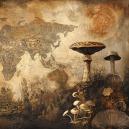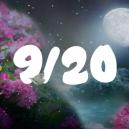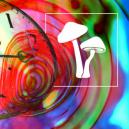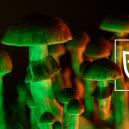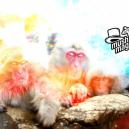Magic Mushrooms: A Cure For Addiction?
Published :
October 7th, 2016
Categories :
Health

Psychedelic drugs have always interested certain subcultures. You may be surprised to know psilocybin - the active ingredient in magic mushrooms - is currently being researched as a potential cure for alcohol and cigarette addictions. The preliminary studies are very promising and the mechanism behind the drug fascinating.
CHEMISTRY
Magic mushrooms are mushrooms that contain the psychedelic compounds psilocybin and psilocin. Biological genera of psilocybin mushrooms include: Galerina, Gymnopilus, Inocybe, Mycena, Panaeolus, Pholiotina, Pluteus, and Psilocybe.
The most commonly used are the Psilocybe genus. Over 100 species are classified in the Psilocybe genus. Magic mushrooms or shrooms are some of the more common colloquial terms for psilocybin mushrooms.
Psilocybin and psilocin are structural analogs of serotonin. A number of serotonin receptors are activated by these psychedelic compounds. Serotonin receptors are found in the central and peripheral nervous system.
Functional analogs of psilocybin and psilocin include a variety of other psychedelic tryptamines, such as DMT (or N,N-DMT), 4-AcO-DMT, 5-MeO-DMT, 5-HO-DMT.
DMT is not orally active - our gut contains enzymes that break down DMT into inactive ingredients. Ritual potions as ayahuasca combine DMT with particular enzyme inhibitors to ensure its efficacy.
Psilocybin and psilocin are both orally active - and functional DMT analogs.
HISTORICAL USE
Magic mushrooms have long been used in shamanic rituals as a way to entheogenic experiences - most commonly in Central America and Africa. There are still unsupported claims of magic mushrooms being used in prehistoric times - some consider them as a source to modern human brain processes. That is highly speculative with not enough material evidence to be considered the scientific truth - still, it does tingle the imagination.
In the modern society psychedelic drugs were rather forgotten, that is until the mid 20th century. 1950’s and 1960’s were a popular time to study psychedelic drugs. The psychedelic therapy - use of psychedelic drugs in therapy - was a common aid in psychotherapy. Psychedelics were considered for treating anxiety, depression, and addictions. It was experimented with a series of other conditions.
In the same period psychedelic drugs were a popular recreational drug. They were most commonly used by the counterculture of the period - the use has been often irresponsible and led to incidents. In the mid 1960’s psychedelic drugs started to get banned around the world. Quite unreasonably research, including psychedelic drugs was also banned, or in some cases just underfunded.
MODERN RESEARCH
While psychedelic drug research was halted in the 1960’s, today, it is on a brink of a resurgence. A shameful statistic shows that in the last 25 years 151 medical studies with psychedelics were conducted, of which only 6 met the established scientific criteria. Reviewed studies suggest beneficial effects for treatment-resistant depression, anxiety and depression associated with life-threatening diseases, and tobacco and alcohol dependence.
PSILOCYBIN AND ADDICTION
One study conducted at John Hopkins University is particularly interesting. Johns Hopkins researchers studied a small group of long time smokers who had previously failed attempts to drop the smoking habit. Psilocybin was used to aid a cognitive behavioral therapy program - and the results are spectacular.
The abstinence rate for the participants in the study was 80 percent after a six-month period.
The abstinence rate of 80 percent is quite remarkable when compared to the results of current approaches to smoking cessation.
Varenicline is thought to be the most effective smoking cessation drug today. When taking varenicline approximately 35% users experience a six-month smoking cessation success - incomparable to the 80 percent shown in the preliminary psilocybin study.
HOW WAS THE STUDY CONDUCTED?
The study was conducted on a small sample of 15 people, 10 men and 5 women. The average age of participants was 51. All the participants have previously tried to stop smoking. On average, the participants smoked 19 cigarettes a day for 31 years.
Two-thirds of the participants reported using hallucinogens in the past, but, on average, the drugs were used 27 years before the study took place.
The subjects were treated with three doses of psilocybin in total; each session introduced a higher dose of the drug. The first dose was administered on the day of the planned smoking cessation. The two other session were held two weeks and eight weeks later.
Each psilocybin session lasted 6 to 7 hours. Participants were put in a comfortable and relaxing setting and monitored by two research team members. The participants wore eyeshades and headphones that played relaxing music - they were all encouraged to relax and focus on their inner experiences.
While taking part in the study, the participants were engaged in a cognitive behaviour therapy aimed to help with smoking cessation. All participants were a part of weekly counseling sessions, and used several other techniques to help them, such as keeping a journal listing their craving triggers.
HOW DOES IT WORK?
When it comes to the principle behind psilocybin aided smoking cessation Matthew W. Johnson, the corresponding author of the study, shared an interesting view: “Quitting smoking isn't a simple biological reaction to psilocybin, as with other medications that directly affect nicotine receptors. When administered after careful preparation and in a therapeutic context, psilocybin can lead to deep reflection about one's life and spark motivation to change.”
Kathleen Conneally was a participant in the aforementioned study. After the study, she successfully stopped with a decades-long smoking habit. Her description of the experience gives us an insight into how psilocybin helps with treating addictions.
Upon consuming psilocybin, she had a vision. In it, she was a vine with a big purple flower on it, feeling proud and all-powerful. She had seen herself stressed and smoking, and had seen her abusive father, but felt like she is above it. All her problems seemed meaningless, smoking was an option but it simply made no sense. Finding a motivation to smoke felt impossible. The feeling continued long after the use of psilocybin and helped Conneally stop smoking entirely.
Withdrawal is an important aspect of addiction, but is most definitely not a key to solving it. Most addictions stem from a psychological problem. As we go through life, we all experience certain traumas. Those often lead to negative thought patterns getting ingrained in our brains and very difficult to break. Those thought patterns end up controlling our behaviour, and in some instances lead to addictive behaviour.
Psilocybin allows cross-talk in our brain - it activates multiple regions in the brain, letting them communicate. This severely changes our regular thought patterns and can lead to revelations about one’s motivations and behaviours.
While the entire research is in its infancy, it shows remarkable potential and offers promises of applications that possibly exceed even our imagination. Brace yourself, for the change might just be around the corner.





